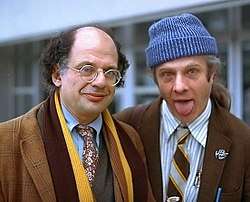Peter Orlovsky
Peter Anton Orlovsky (July 8, 1933 – May 30, 2010) was an American poet and actor. He was the long-time partner of Allen Ginsberg.
Peter Orlovsky | |
|---|---|
 Orlovsky (right) with Allen Ginsberg, 1978 | |
| Born | Peter Anton Orlovsky July 8, 1933 New York City, New York, U.S. |
| Died | May 30, 2010 (aged 76) Williston, Vermont, U.S. |
| Resting place | Shambhala Mountain Center, Red Feather Lakes, Colorado, U.S. |
| Nationality | American |
| Alma mater | Columbia University |
| Years active | 1953–2008 |
| Partner(s) | Allen Ginsberg 1954–1997 (Ginsberg's death) |
Early life and career
Orlovsky was born in the Lower East Side of New York City, the son of Katherine (née Schwarten) and Oleg Orlovsky, a Russian immigrant.[1] He was raised in poverty and was forced to drop out of Newtown High School in his senior year so he could support his impoverished family. After many odd jobs, he began working as an orderly at Creedmoor State Mental Hospital, known today as Creedmoor Psychiatric Center.
In 1953, Orlovsky was drafted into the United States Army for the Korean War at nineteen years old. Army psychiatrists ordered his transfer off the front to work as a medic in a San Francisco hospital. He later went to Columbia University.
He met Allen Ginsberg while working as a model for the painter Robert La Vigne in San Francisco in December 1954. Prior to meeting Ginsberg, Orlovsky had made no deliberate attempts at becoming a poet.[2]
With Ginsberg's encouragement, Orlovsky began writing in 1957 while the pair were living in Paris. Accompanied by other beat writers, Orlovsky traveled extensively for several years throughout the Middle East, Northern Africa, India, and Europe.[3] He also helped produce and contributed vocals to Ginsberg's 1970 LP Songs of Innocence and Experience, based on William Blake's poetry collection of the same name.[4] Orlovsky was Ginsberg's lover in an open relationship until Ginsberg's death in 1997.[3]
In 1974, Orlovsky joined the faculty of the Jack Kerouac School of Disembodied Poetics at the Naropa Institute in Boulder, Colorado, teaching poetry. In 1979 he received a $10,000 grant from the National Endowment for the Arts to continue his creative endeavors.
Death
In May 2010, friends reported that Orlovsky, who had had lung cancer for several months, was moved from his home in St. Johnsbury, Vermont, to the Vermont Respite House in Williston. He died there on May 30, 2010, from complications of the disease; he was 76 years old. He was buried at Shambhala Mountain Center in Red Feather Lakes, Colorado. His epitaph reads: "Train will tug my grave, my breathe hueing gentil vapor between weel & track".
Poetry
- Dear Allen, Ship will land Jan 23, 58 (1971)
- Lepers Cry (1972)
- Clean Asshole Poems & Smiling Vegetable Songs (1978) (reprinted 1992)
- Straight Hearts' Delight: Love Poems and Selected Letters (with Allen Ginsberg) (1980)
- Dick Tracy's Gelber Hut und andere Gedichte (German translation) (1984)
His work has also appeared in The New American Poetry 1945–1960 (1960), The Beatitude Anthology (1965), as well as the literary magazines Yugen and Outsider. Orlovsky appeared in four films: Andy Warhol's Couch (1965) and in three films by photographer Robert Frank, Pull My Daisy (1959) (a partly improvised 26-minute-long film based on a Kerouac script), Me and My Brother (1969) (a film documenting his brother Julius Orlovsky's mental illness) and C'est Vrai! (One Hour) a 60-minute, one-take video made for French television in 1992 whose text was published as a volume in the Hanuman Books series.
Filmography
- Pull My Daisy (1959)
- Chappaqua (1966)
- Me and My Brother (1969)
- C'est Vrai! (One Hour) (1990)
Notes
- Tytell, John (1999). Paradise outlaws: remembering the beats. W. Morrow. p. 30. ISBN 0688164439.
- "Peter Orlovsky: An Inventory of His Papers at the Harry Ransom Humanities Research Center". University of Texas. Retrieved 2011-02-02.
- "Peter Orlovsky, poet and partner of Allen Ginsberg, has died". Latimesblogs.latimes.com. May 31, 2010. Retrieved 2010-06-03.
- Anon. (1970). Songs of Innocence and Experience (LP record). Allen Ginsberg/William Blake. MGM Records/Verve Forecast. FTS3083/MGS2112.
References
- Charters, Ann (ed.). The Portable Beat Reader. Penguin Books. New York. 1992. ISBN 0-670-83885-3 (hc); ISBN 0-14-015102-8 (pbk)
External links
- Peter Orlovsky Papers at the Rare Book & Manuscript Library, Columbia University
- Four Poems
- Peter Orlovsky's papers at the Harry Ransom Humanities Research Center, University of Texas, Austin
- Works by or about Peter Orlovsky in libraries (WorldCat catalog)
- New York Times obituary
- Obituary in The Independent by Marcus Williamson